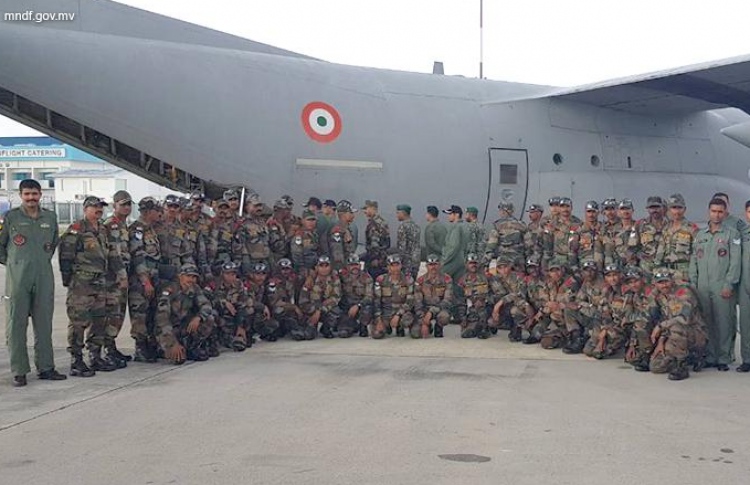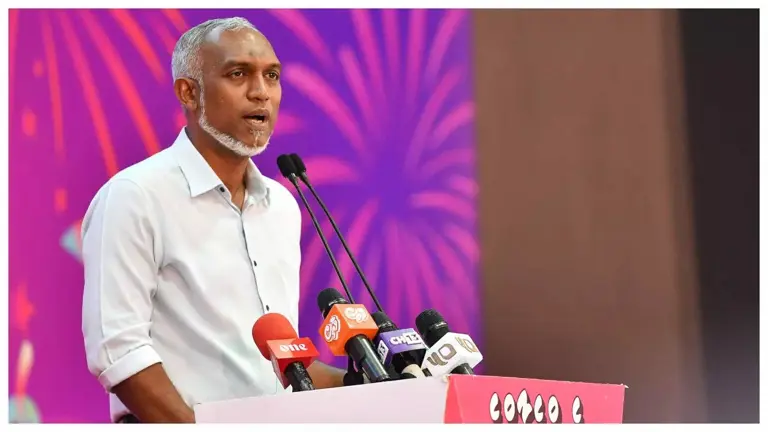Will oust Indian troops from Maldives in 1st week of presidency, diplomatically: Muizzu

Will oust Indian troops from Maldives in 1st week of presidency, diplomatically: Muizzu
Mohamed Muizzu, the soon-to-be President of the Maldives, continues to uphold his electoral commitment to tackle the issue of the presence of Indian military personnel within the archipelago. Significantly, Muizzu has underlined his intention to handle this matter through diplomatic channels, illustrating a preference for a non-confrontational and cooperative approach.
As he prepares to take on the responsibilities of the presidency in the near future, Muizzu has voiced his aspiration to address the situation concerning the Indian troops promptly, with a particular aim to reach a resolution within the initial week of his tenure.
His insistence on a diplomatic route suggests a strategic and calculated approach to managing the delicate geopolitical balance in the region. By indicating his willingness to engage in constructive dialogue and negotiation, Muizzu aims to address the concerns of the Maldivian populace while maintaining stability in the region. The forthcoming days of Muizzu’s presidency are poised to witness critical diplomatic maneuvers, highlighting his commitment to resolving this contentious issue through peaceful and amicable means.
His stance underscores a dedication to finding a peaceful and negotiated solution to the matter, maintaining positive relations with India while addressing the concerns of his constituents. It will be important to watch how Muizzu navigates this issue while balancing diplomatic relations and domestic expectations in the upcoming months of his presidency.

Mohamed Muizzu, viewed as a leader with pro-China leanings, recently emphasized his commitment to his electoral pledge of urging India to withdraw its troops from the Maldives. In an interview with Al Jazeera, Muizzu stated that this action would be among his foremost priorities, even on his first day in office. His victory over the incumbent Ibrahim Solih, perceived as more favorably disposed toward India, in the recent presidential runoff underscores the shift in the country’s political dynamics.
Muizzu highlighted his proactive approach in addressing the issue, indicating his communication with the Indian high commissioner during the transition period. He asserted that he had emphasized the urgency of the matter during the meeting and had received a positive response from the Indian authorities, expressing their willingness to collaborate in finding a resolution.
However, Muizzu conceded his lack of precise knowledge concerning the exact number of Indian military personnel stationed in the Maldives, underscoring the complexities surrounding the issue. As he prepares to assume the presidency, his approach to diplomatically engage with India while maintaining relations with other global powers will be crucial in shaping the Maldives’ foreign policy landscape.
In a recent interview with Al Jazeera, Mohamed Muizzu underscored the historical stance of the Maldives as a traditionally peaceful nation, highlighting the absence of foreign troops on its soil. Expressing concerns about the country’s security, he emphasized the need for maintaining sovereignty and ensuring a peaceful environment, reiterating the importance of not hosting foreign military forces.
Regarding his foreign policy approach, Muizzu emphasized a pro-Maldives stance, stating that the country’s interests would remain the top priority. He articulated a non-aligned stance, indicating that the Maldives would not align itself with any particular nation to simply appease them. Instead, the focus would be on securing the best interests of the Maldives, and any country that respects and supports this principle would be regarded as a reliable ally.
Muizzu’s statements point to a nuanced diplomatic strategy, suggesting a pragmatic and balanced approach that prioritizes the country’s security and interests while maintaining bilateral relations with various global powers. As he assumes the office, his ability to navigate complex international dynamics while safeguarding the Maldives’ sovereignty will likely be closely monitored.





